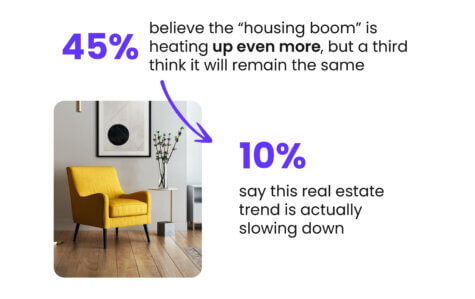-
Despite reports of boom ‘cooling off,’ 45% think real estate trend catching on fire even more.
-
Survey reveals tough times for renters: 56% want to move, but can’t afford to
NEW YORK — Nearly six in 10 Americans believe “right now” is the time to buy a home. A survey of 1,000 homeowners and 1,000 renters examined how they view the current housing market, revealing that 55 percent of all respondents admit inflation has made them much more eager to purchase a property.
While 30 percent are optimistic the housing market will change for the better in the next year, 43 percent see it as “very” concerning, with a quarter thinking it will change for the worse (24%). Although news reports state that the “housing boom” – a period where housing prices explode due to high demand – is cooling off, 45 percent believe this real estate trend is heating up even more.
A third think this housing trend will remain the same, and only 10 percent say the housing boom is actually slowing down. Surprisingly, 43 percent predict the housing market will return to the way it was pre-pandemic.
Hot housing market: Half of Americans want to be homeowners by 2023
The study, conducted by OnePoll on behalf of multi-channel fintech mortgage lender Lower, also asked respondents about their home-buying plans, finding that 47 percent say they’re planning to purchase one in the next year. Of that group, three in four say it would be their first time purchasing a home (74%), while 26 percent identified as homeowners who plan to buy another property.
The reasons for buying a home are simple: 51 percent of survey-takers see a home as an investment opportunity to gain financial freedom and half want to break into the housing market before home appreciation rises more. Many want to live comfortably when they retire (42%).
Meanwhile, 41 percent of homeowners and renters yearn to buy their first home or another property because they’re simply bored with their current living situation. Others say purchasing a home would be ideal for their growing family (41%) and their children’s future (40%).
“Homeowners have gained tens of thousands in equity over the past few years. This is money renters have left on the table,” says co-founder and CEO Dan Snyder in a statement. “A lot of people are waiting until prices cool off, but the reality is, they’ll just slow down from their record-breaking pace. Now is the time to buy before appreciation continues to climb.”

The rent really is too damn high
As the cost of living continues to rise nationwide, most renters in the survey say they want to move but can’t afford it (56%).
The study suggests rent these days is not cheap, with 27 percent of the renters surveyed saying they pay $2,001 to $3,000 in rent monthly. A fifth pay in the $1,001 to $2,000 range and 16 percent fork up $3,001 to $4,000 per month to meet rent costs.
Despite these realities, 57 percent of renters are hopeful they’ll become homeowners one day. Renters and homeowners also shared their views about what a home should do for someone’s future. Securing stability came out on top at 40 percent, followed by living comfortably during retirement (38%), having a place to sleep and eat (36%), and providing an opportunity to gain financial freedom (35%).
For a majority of homeowners, their property offers a sense of financial security since 62 percent feel building home equity is like having a ready-made savings account.
“It may seem daunting, but it doesn’t have to be,” Snyder says. “Find a real estate agent and a lender who value the customer experience by creating a certain, simple process. They’ll help you along the way and your biggest worry will be finding the perfect home.”
